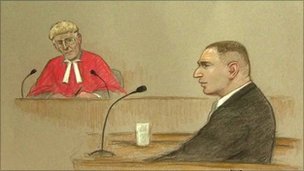Il pentito Robert Stewart, che sta testimoniando contro i suoi ex sodali della UVF, è stato avvertito dal giudice di non imprecare durante la testimonianza

Tuttavia, quando lo ha fatto per la seconda volta, il giudice Gillen è intervenuto per avvisarlo che “non sarà più tollerato”. Quindi Stewart si è scusato.
Stewart sta testimoniando contro 14 uomini, accusandone 9 di partecipazione all’omicidio del rivale lealista Tommy English nell’ottobre 2000, insieme a molte altre accuse, dal possesso di armi da fuoco ai pestaggi punitivi.
Insieme a suo fratello David, Robert è divenuto testimone per l’accusa in cambio di una riduzione del 75% dei termini detentivi per il coinvolgimento nell’assassinio di English. Tra gli uomini accusati dagli Stewart, anche il presunto comandante UVF di Mount Vernon nonché agente dello Special Branch, North Belfast, Mark Haddock.
Durante una nuova sessione di interrogazioni dell’avvocato difensore McDnald, che rappresenta David Miller, la prima imprecazione pronunciata da Stewart è giunta quando ha cercato di spiegare il motivo di alcune discrepanze sul ruolo attribuito a Miller nell’omicidio.
La seconda imprecazione è sfuggita a Robert Stewart quando McDonald gli ha chiesto perché i due fratelli hanno cambiato il racconto su chi aveva sequestrato un taxi e su come i suoi vestiti ed un’imitazione di arma da fuoco vennero distrutti.
McDonald ha chiesto ripetute volte il motivo del cambiamento del racconto, se fosse stato perché avevano visto una “virtù” nel dire la verità o se fosse perché il loro “accordo” sarebbe stato ritirato qualora fossero stati “sorpresi” a dire una menzogna.
C’è stata una risata tra i numerosi avvocati e gli imputati quando Stewart ha commentato: “Se non fossi stato onesto non sarei seduto qui”, ma quindi si è corretto, spiegando di voler dire che se fosse stato onesto “all’epoca, non sarei seduto qui”.
Ha convenuto che nel corso di una testimonianza fornita alla polizia, ha confessato di aver “tratto in inganno un tribunale, fornendo un alibi falso o dando falsa testimonianza”, ma quando gli viene chiesto dall’avvocato McDonald a cosa si riferisse, ha risposto: “Non lo so. Ho già spiegato di essere stato membro dell’UVF per 14 anni, mentendo, pestando la gente e facendo le cose peggiori possibili – questo è solo parte della vita”.
Più tardi Stewart ha negato che lui e suo fratello hanno parlato di quanto avrebbero detto in aula, affermando che, considerato il suo disturbo bipolare, il processo e la loro testimonianza erano “l’ultima cosa di cui vorrebbe parlare”.
Il caso continua.
Tratto da Utv
Supergrass warned over swearing
Supergrass witness Robert Stewart, who is testifying against his former alleged UVF comrades, has been warned by the judge not to swear during his evidence.
However when he swore for the second time, Diplock judge Mr Justice Gillen interjected to warn him that “it will not be tolerated” and Stewart apologised.
Newtownabbey man Stewart is giving evidence against a total of 14 men, accusing nine of them of involvement in the murder of rival loyalist chief Tommy English in October 2000, amongst numerous other offences ranging from firearms offences to punishment attacks.
Along with his brother David, Stewart turned Queen’s evidence and in exchange for a 75% reduction of their jail terms for their involvement in the murder, agreed to give evidence against the men, including alleged special branch informer Mark Haddock.
During an often tense session of cross-examination by one of the defence QCs, Mr McDonald – representing David Miller, Stewart’s first expletive came as he tried to explain why there were inconsistencies in what role he attributed to Miller in the murder.
His second expletive came when Mr McDonald asked him about why the brothers had changed their stories over who hijacked a taxi and how his clothes and a replica firearm came to be disposed of.
Mr McDonald asked several times why the story was changed, whether it was because they saw the “virtue” in telling the truth or whether it was because their “deal” would crumble if they were “caught out” on a lie.
There was a chuckle among the numerous barristers, solicitors and even the defendants sitting in the dock when Stewart commented: “If I wasn’t honest I wouldn’t be sitting here” but then corrected himself telling the court he meant that if he was honest “in my old days I would not be sitting here”.
He agreed that during one police interview, he confessed that he had “mislead a court, gave a false alibi or gave perjured evidence”, but when asked by Mr McDonald what they were in reference to, he told the court: “I don’t know. I have already explained that I was in the UVF for 14 years, lying and beating people up and doing the worst things possible – that’s just part of life.”
Later Stewart denied that he and his brother had spoken about the accounts they would give to the court, claiming that as he suffers from bi-polar disorder, the trial and their evidence is the “last thing he would want to talk about”.
The case continues.